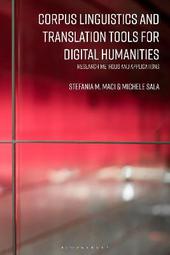
|
Corpus Linguistics and Translation Tools for Digital Humanities: Research Methods and Applications
Hardback
Main Details
| Title |
Corpus Linguistics and Translation Tools for Digital Humanities: Research Methods and Applications
|
| Authors and Contributors |
Edited by Stefania M. Maci
|
|
Edited by Michele Sala
|
| Physical Properties |
| Format:Hardback | | Pages:248 | | Dimensions(mm): Height 234,Width 156 |
|
| Category/Genre | linguistics |
|---|
| ISBN/Barcode |
9781350275225
|
| Classifications | Dewey:025.060013 |
|---|
| Audience | | Professional & Vocational | |
|---|
| Illustrations |
18 bw illus
|
|
Publishing Details |
| Publisher |
Bloomsbury Publishing PLC
|
| Imprint |
Bloomsbury Academic
|
| Publication Date |
11 August 2022 |
| Publication Country |
United Kingdom
|
Description
Presenting the digital humanities as both a domain of practice and as a set of methodological approaches to be applied to corpus linguistics and translation, chapters in this volume provide a novel and original framework to triangulate research for pursuing both scientific and educational goals within the digital humanities. They also highlight more broadly the importance of data triangulation in corpus linguistics and translation studies. Putting forward practical applications for digging into data, this book is a detailed examination of how to integrate quantitative and qualitative approaches through case studies, sample analysis and practical examples.
Author Biography
Stefania M. Maci is Professor of English Language (University of Bergamo, Italy). Michele Sala is Associate Professor of English Language (University of Bergamo, Italy).
ReviewsA timely, innovative book on the analysis of texts and corpora in digital humanities bringing together a number of thoughtful contributions from corpus methodologies, discourse analysis and translation studies. -- Jose Santaemilia, Full Professor of English, University of Valencia, Spain This volume addresses a critical gap by bringing together three major research domains: translation studies, digital humanities and corpus linguistics. As such, it will be an important tool for students and researchers in all three areas to better understand the (potential) intersections between them in both theoretical and practical terms. -- Charlotte Taylor, Senior Lecturer in English Language and Linguistics, University of Sussex, UK
|